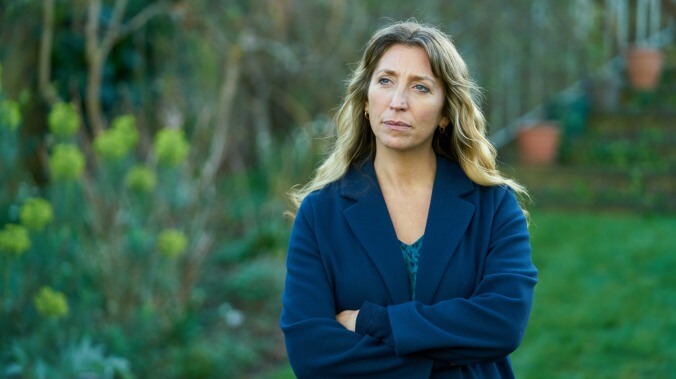Season three picks up in the immediate aftermath of Paul moving out of the house after Luke punched him. The teen’s momentary violent outburst shakes up the family deeply, especially as Luke still struggles to be in the same room as his dad in fear of an impending panic attack. To help control Luke’s consternation, Paul lives at the home of his mother-in-law Leah (Stella Gonet) while she enjoys her Croatia honeymoon. Paul briefly even enjoys the solitude, at least until his own parents—the downright entertaining Jim (Alun Armstrong) and Jackie (Joanna Bacon)—turn up. Breeders can always count on Armstrong and Bacon to deliver trademark dry British humor. Their interactions with each other, and everyone else, bring just the right amount of comic relief.
The show devotes sufficient time to slowly repairing Paul and Luke’s relationship. Again, it’s not interested in easy fixes and solving a problem with just candid conversations. That’s not how real life works. Paul apologizes, slips up and shouts some more, works to improve himself, and maybe slips up again. Breeders’ writing mostly succeeds at keeping the cycle authentic, although it can border on repetition in other stories. Season two already tackled a sort-of-but-not-really infidelity subplot when Ally shared a quick kiss with a fellow parent from school. Now, Paul forms a bond with Gabby (Sally Phillips), his temporary neighbor at Leah’s, sneaking in movies and lunches with her. Their slow-burn arc will factor in during the season’s latter half and—hopefully, as five of ten episodes were watched for this review—avoid cheating clichés.
Meanwhile, as Paul is working on his anger-management issues, Ally singlehandedly picks up the pieces at home. She’s temporarily raising two youngsters alone, and attempting to maintain peace between her husband and son, all while dealing with a major work and health crisis. If season two’s crux was Paul and Luke’s clashing, the new episodes center more on Ally’s growing isolation. Haggard delivers a striking maneuver: She keeps her character on the verge of a breakdown without losing any gravitas and still packs a real punch with her comic timing.
The show also gets to dissect Ally and Ava’s bond. Too wise for her age, Ava believes she’s put on the back burner by everyone else. She misses having Paul around, is annoyed by Luke seemingly getting his way, and feels terribly distant from her mother. It’s only natural for her to feel abandoned in the messy family drama. (Can’t you just sense all younger siblings nodding along in agreement?) The parallel of Ally going through early menopause and Ava getting her first period—both events resulting in heightened emotions—is fodder for heartfelt stories between the two.
At one point, a vexed Ally juggles between shouting at Ava and a pharmacist while hunting for estrogen medication. “I’m not a bad mother; I’m a good mother at the end of her rope,” she says. The crushing and utterly realistic dialogue, delivered passionately by Haggard, perfectly surmises Breeders’ outlook on parenting. The comedy’s reliability is its strength, but it’s also why most people might find it difficult to get through. Still, if viewers can survive the parental nightmare there’s also joy and laughter to be found. There are quiet moments of happiness—Paul saving Luke from an embarrassing presentation, Ally’s birthday party for Ava, and everything Jim and Jackie say or do. It won’t be laugh-out-loud or sappy, but Breeders remains one of the most grounded family comedies on air right now.









































